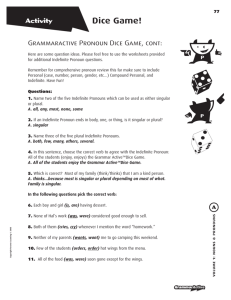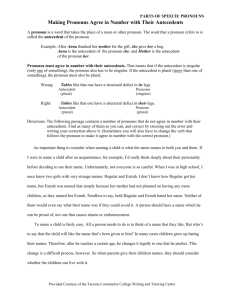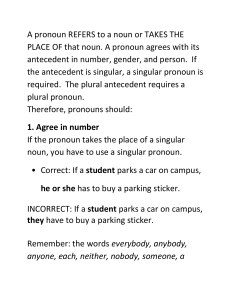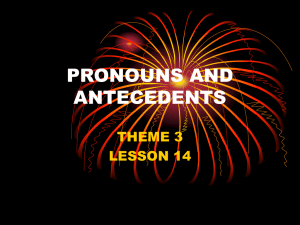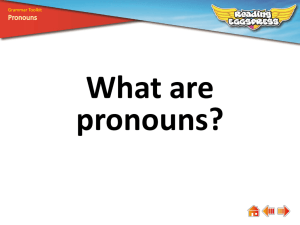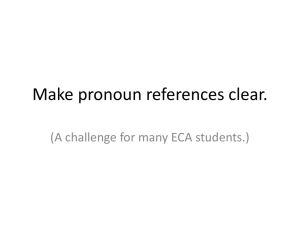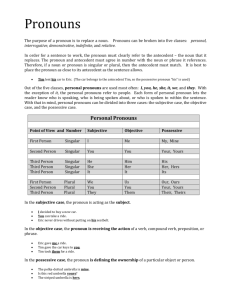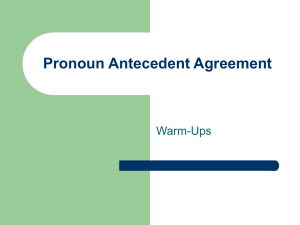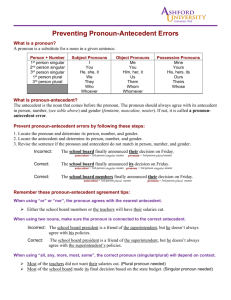File
advertisement
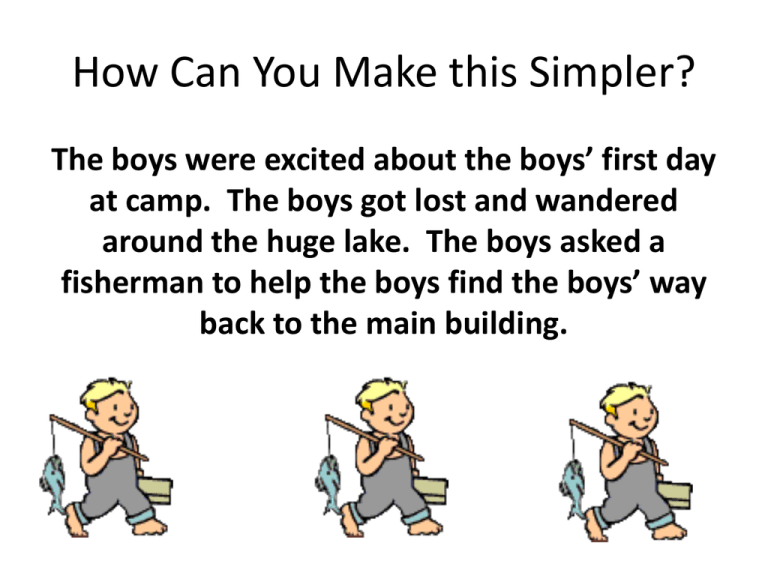
How Can You Make this Simpler? The boys were excited about the boys’ first day at camp. The boys got lost and wandered around the huge lake. The boys asked a fisherman to help the boys find the boys’ way back to the main building. Grammar Mini Lesson Pronoun Uses and Agreement By: Meghan, Jill, Kim and Rachel What is a Pronoun? A pronoun is a word used in place of a noun or more than one noun The word that a pronoun stands for is called its antecedent. When Cindy Davis came to the bus stop, she was wearing a raincoat. My aunt sold her car. Pronoun Pointers • A pronoun must agree in number — singular/plural — with the thing to which it refers (its antecedent). Bill took his hat (Bill=singular antecedent) + (his= singular pronoun) The girls read their book. (girls = plural) + (their= plural pronoun) Pronoun Pointers • The indefinite pronouns: anyone, anybody, everyone, everybody, someone, somebody, no one, and nobody are always singular. This is sometimes confusing because some feel that everyone and everybody are referring to more than one person. Compound Subjects When there are multiple subjects joined by “or” or “nor” the pronoun must agree with the closest subject Neither the actor nor the director did his or her job. (director = singular subject) Neither the girl nor the boys would clean their hands. (boys = plural subject) Plural Indefinite Pronouns Several, few, both and many are plural Several of the children played with their toys. Gender Agreement The need for pronoun-antecedent agreement can create gender problems • If one were to write, for instance, "A student must see his counselor before the end of the semester," when there are female students this would be an issue. • One can instead pluralize, in this situation, to avoid the problem: -“Students must see their counselor before the end of the semester.” -“A student must see his or her counselor.” Whom or Who???? One of the most frequently asked questions about grammar is about choosing between the various forms of the pronoun who: who, whose, whom, whoever, whomever. To choose correctly among the forms of who, re-phrase the sentence so you choose between he and him. If you want him, write whom; if you want he, write who • Who do you think is responsible? (Do you think he is responsible?) • Whom shall we ask to the party? (Shall we ask him to the party?) • Give the box to whomever you please. (Give the box to him.) • Give the box to whoever seems to want it most. (He seems to want it most.) Subject or Object Are you looking for the subject? Or are you looking for the object of a verb or preposition? The subject is the doer of the action – use these pronouns if it is subjective: The object is the receiver of the action – use these pronouns if it is objective: I you she he it we they who Him them you me her us it References • http://grammar.ccc.commnet.edu/grammar/ pronouns.htm • http://www.towson.edu/ows/pro_antagree. htm Let’s Practice!! The dogs tugged on _______ leashes. 1. its 2. their Answer: their Everyone should bring _____ mother to the picnic. 1. their 2. his or her Answer: his or her This is a matter for you and ___ to decide. 1. I 2. me Answer: me _____ and ___ are going on a long trip. 1. she--I 2. her--me Answer: she--I Linda gave _____ a pumpkin from her garden. 1. he 2. him Answer: him Saul’s brother left the matter up to ___ and ____. 1. him--me 2. him---I Answer: him---me Did you see Derek and ____ at the game? 1. her 2. she Answer: her The cost of the movie shocked both my brother and ____. 1. I 2. me Answer: me _______ is bringing the holiday turkey? 1. who 2. whom Answer: who To _____ is the envelope addressed? 1. who 2. whom Answer: whom
